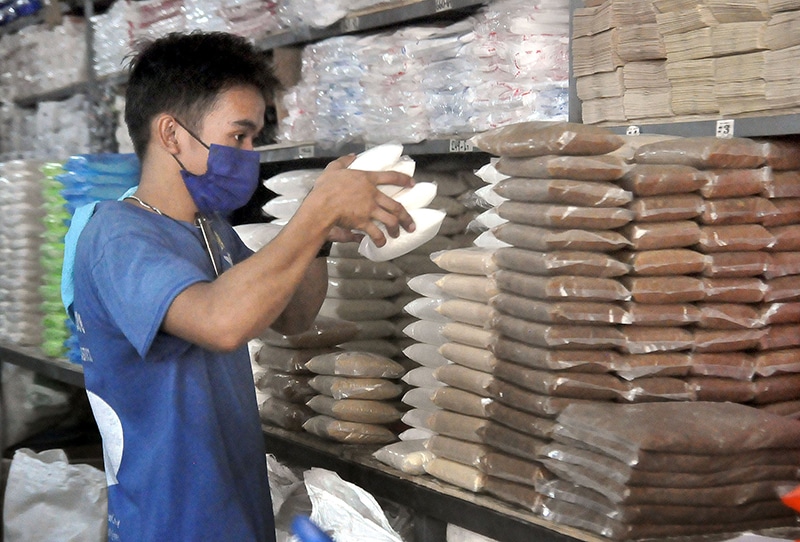The Sugar Regulatory Administration has authorized the importation of 440,000 metric tons of refined sugar to bring down the price of the sweetener and manage local demand.
According to Pablo Luis Azocana, sugar board planters’ representative at the SRA, the government allowed for the importation of 200,000 MT of sugar classified for domestic use or “B” sugar and another 240,000 MT as buffer stock, classified as “C” or reserve sugar.
“We have an allocation for immediate arrival. This is expected to drive prices down to about 85 percent,” he said at the Laging Handa public briefing Wednesday.
Azocana stressed that imported sugar will be priced accordingly so as not to hurt farmers, some of whom are opposing the move.
“It is our goal that farmers get a fair price for their produce so that they will continue farming,” he said, adding that the government refused to give in to proposals to import raw sugar instead of refined since the local harvest provides bountiful reserves of raw sugar.
Based on Sugar Order (SO) No. 6 series of 2022-2023, the country’s second sugar import program aims to maintain a balanced supply and demand of sugar for domestic consumption while ensuring stable prices.
“The unpredictable weather conditions and the anticipated increase in demand of sugar due to easing of restrictions brought about by the pandemic, deems it necessary to authorize this second sugar import program for crop year 2022-2023,” the SO read.
The first tranche of 100,000 MT refined sugar is estimated to arrive soon “for consumers to immediately feel the effects of declining sugar prices.”
The second tranche of another 100,000 MT is expected to arrive before April 1, and the final tranche of 240,000 MT is set to arrive after that date.
Azacona said the government may release the final tranche classified as “C” sugar during the offseason, and only upon assessment of the demand situation by the SRA and after the reclassification of the reserved volume to “B” sugar.
Imported sugar will be stored in SRA-accredited warehouses or direct to the consumers’ warehouse as indicated in the importer’s application.
But Unyon ng mga Manggagawa sa Agrikultura (UMA) chairperson Ariel Casilao said importation will hurt the local sugar industry.
“If we talk about the entry, the flooding of 440,000MT of sugar, we can be sure that our local sugar, our local production which is ongoing with our current milling season, will drop (in value),” he said in a TeleRadyo interview.
Casilao, a former lawmaker, said the sugar supply in the country is enough for domestic consumption.
“Those lacking (sugar) are who we call the bottlers, those making soft drinks or those corporations that need refined sugar,” he explained.
This problem, in turn, could have been solved had the government funded the modernization of sugar mills around the country, the UMA chief said.
“That comes from the backward machinery in our refineries here. We have machines in our milling and refineries that are 50 to 100 years old. But according to the SIDA or Sugar Industry Development Act, our local sugar industry should have received enough funding for its maintenance and development,” he noted.
But the United Sugar Producers Federation welcomed the government’s move to import more sugar, as its president Manuel Lamata said this will help consumers.
“For our consumers and bakers, the panaderias (bakeries), they can finally use cheap sugar from our markets,” he said.
“Our local sugar traders are doing too much (profiteering), that is all because of speculation. They speculate that our sugar supply might not be enough for the year, so they stocked up, they kept buying, and only release their stock slowly into the market,” Lamata said.
“But now that this 440 (thousand metric tons) of sugar are coming, they can’t do anything… what they bought at cost, they can’t do anything, they have to sell it cheap,” he added.
Casilao said he doubts that importation will really bring down sugar prices in the country.
“Past importations have not actually reduced prices, really. That’s the same premise used for the price of rice. Has there been a P20 or P25-per-kilo of rice in the market because of imported rice? None,” he said.
The former lawmaker said the government should help revive the operations of a big sugar mill, the Central Azucarera Don Pedro in Batangas, that has shut down.
“This mill had produced 12,000MT a day, but it closed down because local businessmen have suffered losses along with its owners, the Roxas family,” he said.
Casilao suggested that the government temporarily take over the mill or have a joint operational management contract between the Roxas family and the SRA so it can keep operating.


